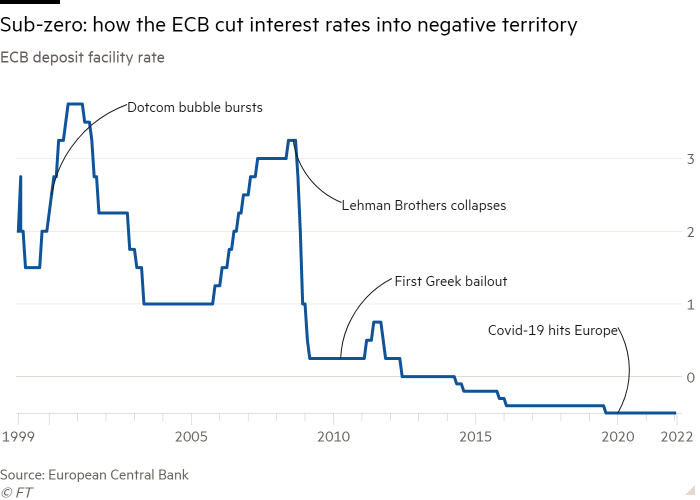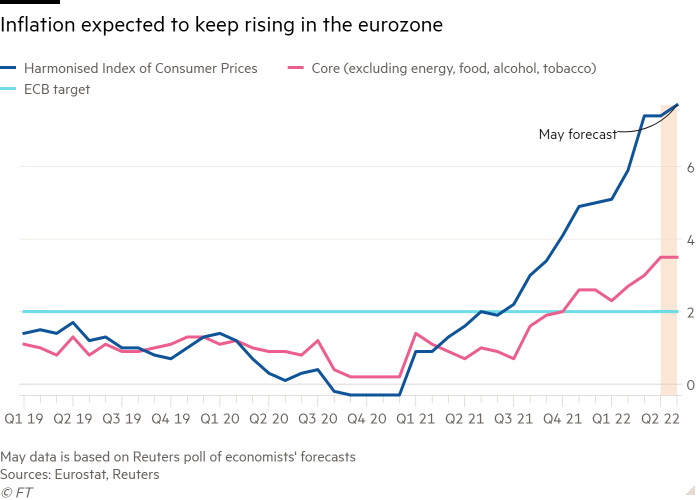[ad_1]
The European Central Bank’s chief economist has said quarter-percentage point interest rate rises in July and September will be its “benchmark pace”, rebuffing calls for a bigger increase to end its negative rate policy instantly this summer.
Eurozone inflation is expected to hit a new high of 7.7 per cent when figures for May are published on Tuesday — nearly quadruple the ECB’s 2 per cent target. But its chief economist Philip Lane said the process of removing its stimulus “should be gradual”.
“Normalisation [of monetary policy] has a natural focus on moving in units of 25 basis points, so increases of 25 basis points in the July and September meetings are a benchmark pace,” he told Spanish business newspaper Cinco Días.
Lane was more specific than ECB president Christine Lagarde, who last week signalled for the first time a clear plan to end its eight-year experiment with negative rates by saying borrowing costs were on track to hit zero by the end of September.
The ECB’s deposit rate is minus 0.5 per cent and has been in negative territory since 2014, when the region faced a sovereign debt crisis. Most of its policymakers agree on the need to start raising rates, but there are divisions over the pace of the move.

Economists said Lane’s comments on Monday were an attempt to quash calls by more hawkish members of the ECB’s governing council for it to follow the lead of the US Federal Reserve by raising rates at a more aggressive pace of half a percentage point at a time.
“The only explanation I can come up with is that this is indeed a desperate attempt by Lane (and Lagarde) to take back control of the discussion and to prevent a 50-basis point rise in July,” said Carsten Brzeski, global head of macro research at ING.
Austria’s central bank governor Robert Holzmann, one of the most hawkish members of the ECB governing council, said last week that it should raise rates by half a percentage point in July as “everything else risks being seen as soft”.
But ECB executive board member Fabio Panetta warned that “signs of economic stress are emerging in the hard data — signs which may become more visible in the coming months”. In that context, pre-committing to change policy “seems unnecessary and unwise”, he added.

Data published on Monday showed inflation in Spain had risen faster than expected in May to 8.5 per cent, while German inflation is expected to have risen to 8 per cent, its highest level for more than 40 years.
The ECB is expected to predict that inflation will remain higher than it previously estimated, while growth will be slower than anticipated, when it issues new economic forecasts at its meeting in Amsterdam next week.
Despite the continued surge in inflation, the ECB is likely to keep rates on hold next week, while announcing plans to stop buying more bonds at the start of July.
Lane said any further ECB rate rises after September would depend on how the economy performs.
“This debate will continue in the autumn and at that point we’ll have more information and will know more about the dynamic of inflation and second-round effects on wages,” he said.
Lex Hoogduin, a professor at the University of Groningen and a former board member of the Dutch central bank, tweeted that by only “reluctantly raising interest rates to zero” the ECB was “taking a very big risk”.
[ad_2]
Source link

